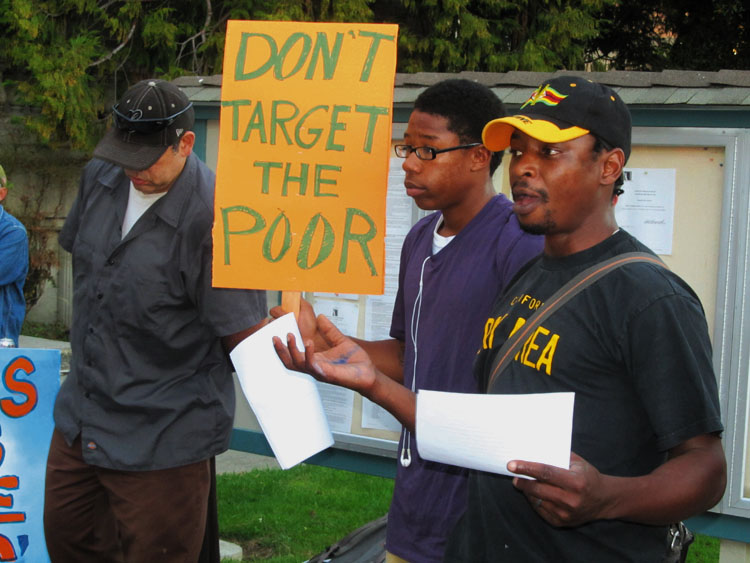
by Ariel Messman-Rucker
[dropcap]B[/dropcap]erkeley City Councilmembers Jesse Arreguin, Max Anderson and Kriss Worthington all agree that there is no correlation between homeless activity and business decline, as claimed by the backers of Measure S, the anti-sitting ballot initiative.
Instead, they say Mayor Bates’ proposed sitting ban is simply an ill-conceived plan that places the blame for the economic downturn unfairly on homeless people.
Worthington denounced Measure S as immoral and a diversion from the issues of homelessness and poverty. He said, “I see it as a giant diversion from the real issues of economic development and I see it as an immoral way to divert people’s attentions from what is really going on.”
In an interview with Street Spirit, Worthington said that one way to measure the economic climate for businesses in Berkeley is to map out where the sales tax has declined the most. It becomes clear that business revenues and sales taxes have declined the most in places with a smaller concentration of homelessness. This gives the lie to the repeated efforts by some business owners to blame homeless people for declining profits.
“So this whole thing has just gotten people really arguing with each other about (Measure S) and ignoring that the decline in sales tax is actually much more severe in other parts of the city like Solano Avenue and the Gourmet Ghetto,” Worthington said. “But they don’t want to talk about the decline of sales tax there and all the vacant storefronts all over the city in places where there are no homeless people on the sidewalk.”
Pattie Wall, executive director of the Homeless Action Center and a volunteer and treasurer for the No on S/Stand Up for the Right to Sit Down campaign, said it was a fallacy and an act of deception for Berkeley politicians to blame business woes on the presence of homeless people.
Wall said, “I feel like the biggest problem is the leadership. The mayor and some of the people on the city council have led merchants to believe and have deceived merchants into believing that if they pass this law that business is going to get better — that is the biggest fallacy about all of this.”
Rather than being a positive attempt to restore “civility” to city sidewalks, the Measure S campaign has attempted to stir up public resentment against a disadvantaged minority. Rather than helping businesses, Wall said, these campaign tactics are only vilifying poor people and creating an atmosphere of intolerance.
“It allows people to vilify homeless people in a way that makes them feel good and has no relationship to making business better,” Wall said.
